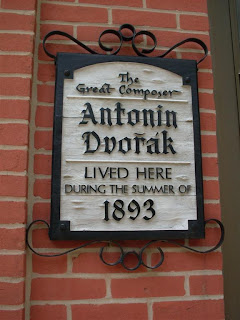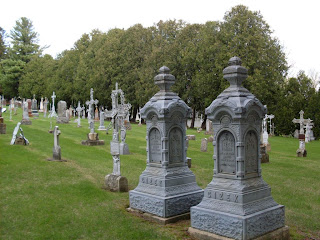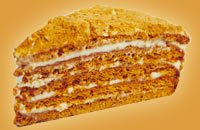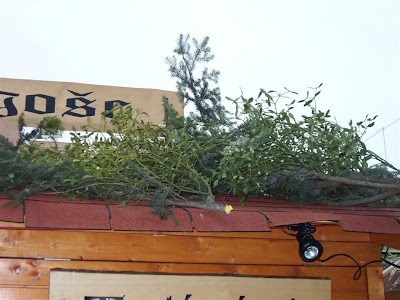Haven't heard of it? I'm not surprised. Spillville, Iowa has all of 400 people.
When famous Czech composer Antonin Dvorak was in New York City composing his New World Symphony, he longed for the company of his Bohemian countrymen. Rather than going all the way back home for a dose of "Czechness," his secretary urged him to go West instead to the tiny village of Spillville, Iowa which was chock full of Czech immigrants.
The building where he and his family lived has been turned into a museum. It showcases two themes: Dvorak's summer in Spillville, and the breathtaking woodworking creations of some bachelors farmers who became famous handcarving incredible clocks. They are called Bily Clocks and they have to be seen to be believed. It's hard to conceive that the two craftsmen who created them never traveled more than 35 miles from Spillville and only went to school through 5th grade. The tour guide winds up every mechanical clock and shows you it's movements.
It's not every town of 400 people
that have an honest-to-goodness
tourist attraction like this.
If you are the slightest bit interested in woodworking,
creativity, or spirituality you should see these clocks.
The farmers viewed them as a way to glorify God.
Museum guests are not allowed to take pictures of them.
The building can't be missed.
It's on the main thoroughfare through town.


I teared up when I walked into the gift shop
and was surrounded by a whole room of Czech stuff.

Fairy tales written by the famous Czech author
Božena Némcová

I enjoyed learning about Dvorak's stay both in New York City
where he completed his New World Symphony
and in Spillville, Iowa.
There was lots of interesting background on
American reaction to his Symphony.
American reaction to his Symphony.

Americans, including Dvorak's patroness,
were determined to develop "American music."
When Dvorak, himself an "oppressed person,"
if you want to call him that
as a Czech in the Czechlands
during the Austrian-Hungarian Empire,
suggested to Americans they had all the material
they needed for a grand American-style music
in the music of African-Americans and Native Americans.
White Americans derided his ideas
with a bemused "Imagine he said that!" attitude.
White America said it in Decorah, Iowa
where this article is from.
where this article is from.
But they said it in New York City too.
Dvorak was ahead of his time.

His first morning in Spillville
he went down to the Turkey River
and enjoyed the birds singing
even before he talked to anyone in town.

I can imagine being in Spillville
felt very much like being in a Czech village.

Since I worshiped at St. Clement's Church in Prague,
I was delighted to discover a St. Clement's Church in Spillville.


Other signs of Czech life:
the oldest Czech school in America.

The church and church cemetery
at St. Wenceslaus Church.
at St. Wenceslaus Church.
Dvorak liked to play the organ here.



A few years after the Velvet Revolution happened, the tiny village of Spillville was newly energized to put on a festival costing $60,000 celebrating their Czech heritage. That's a lot of ambition for a tiny town of 400.
Bravo to them. Click on this link to read about it. Click on my title for more information about the museum.

































.jpg)
















 Who links to me?
Who links to me?
